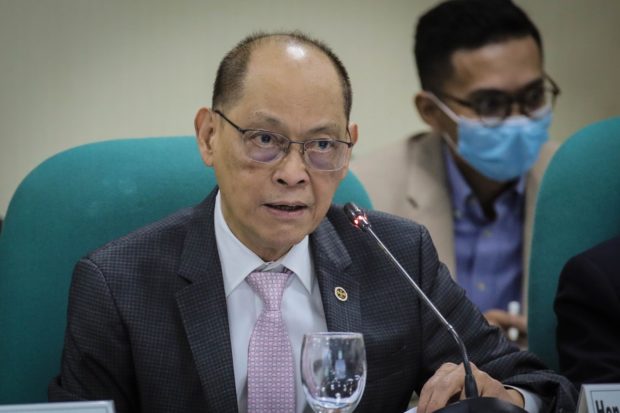Gov’t getting tax windfall from economy’s reopening

Finance Secretary Benjamin Diokno (File photo/Senate PRIB)
Additional revenues gained through the ongoing comprehensive tax reform program (CTRP) surged by 26 percent to P202.8 billion in 2022 from P160.5 billion a year earlier thanks to economic reopening.
Finance Secretary Benjamin Diokno told reporters that such a significant increase in incremental revenue was observed on the back of full economic recovery due to lifting of stringent quarantine measures.
In 2022, total collections from the CTRP’s Package 1—the Train (Tax Reform for Acceleration and Inclusion) Law—alone jumped by 27 percent to P216.5 billion from P171 billion in 2021.
Implemented since the start of 2018, the Train Law is intended to correct a number of deficiencies in the tax system to make it simpler, fairer, and more efficient.
On the other hand, collections from Package 1B or the Tax Amnesty Law dropped by 69.6 percent to P1.4 billion last year from P4.6 billion a year earlier.
Meanwhile, collections from Package 2+ or the Sin Tax Laws leaped by 23 percent to P65.3 billion from P52.9 billion.
Further, revenue losses from Package 2 or Corporate Recovery and Tax Incentives for Enterprises (Create) Law rose by 18 percent to P80.4 billion from P68 billion.
Still, Diokno said major gains were seen last year in the imported petroleum excise tax, sweetened beverage excise tax, documentary stamp tax, tobacco and alcohol sin taxes.
These taxes accounted for a total of P272.3 billion in revenues last year.
Excise tax collection on petroleum products grew by 10.7 percent to P132.6 billion from P119.8 billion.
“The higher excise collection was due to higher volume of oil imports, and the implementation of the fuel marking program of the national government,” the finance chief said.
Excise collection from sweetened beverages increased by 12.7 percent to P44.3 billion; from tobacco by 2.5 percent to P15.7 billion; and from alcohol 23 percent P31.8 billion. Documentary stamp tax collection surged by 58.8 percent to P58.8 billion.
These numbers bode well for the Marcos administration’s fiscal goals of shepherding the budget deficit and the debt stock levels toward more manageable levels.
Remedy to debt
As of the end of 2022, the national government’s debt stock was pegged at P13.4 trillion which represented 60.9 percent of gross domestic product (GDP).
Meanwhile, the budget deficit ballooned to P1.6 trillion in 2022 from P378 billion in 2021.
Expectations of improving fiscal data have helped the national government gain a better credit rating outlook from Fitch Ratings, which revised to stable its negative outlook on the country’s investment-grade “BBB” rating.
“Our credit strength is rooted in prudent fiscal policy making, guided by the Medium-Term Fiscal Framework that the economic team developed at the very beginning of the (Marcos) administration,” Diokno said.
“We remain committed to our targets under the framework,” Diokno added, referring to lowering the debt-to-GDP ratio to below 60 percent by 2025, narrowing the deficit-to-GDP ratio to 3 by 2028, and keeping infrastructure spending at 5 to 6 percent of GDP. INQ
Read Next
Subscribe to INQUIRER PLUS to get access to The Philippine Daily Inquirer & other 70+ titles, share up to 5 gadgets, listen to the news, download as early as 4am & share articles on social media. Call 896 6000.
For feedback, complaints, or inquiries, contact us.
For all the latest Business News Click Here
For the latest news and updates, follow us on Google News.



